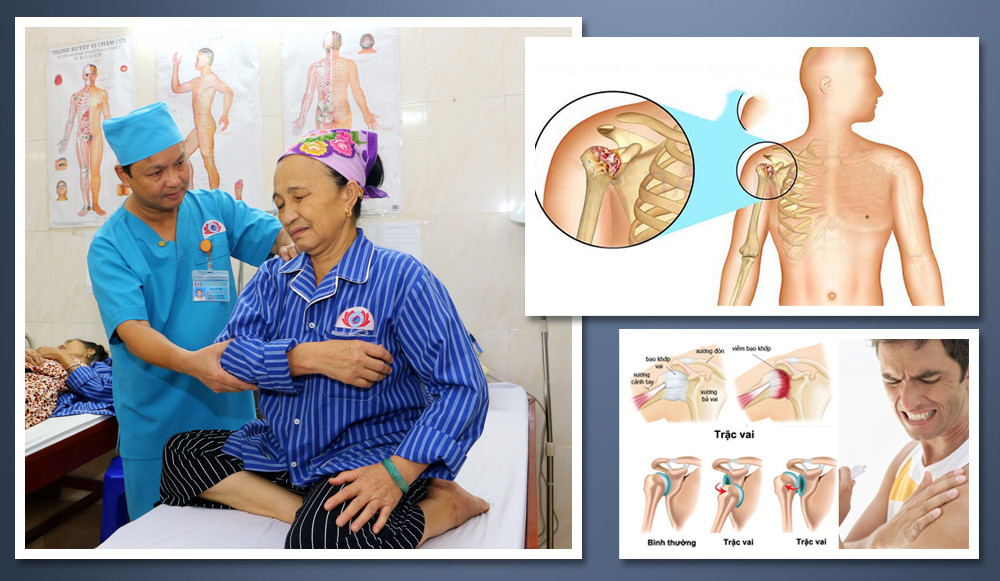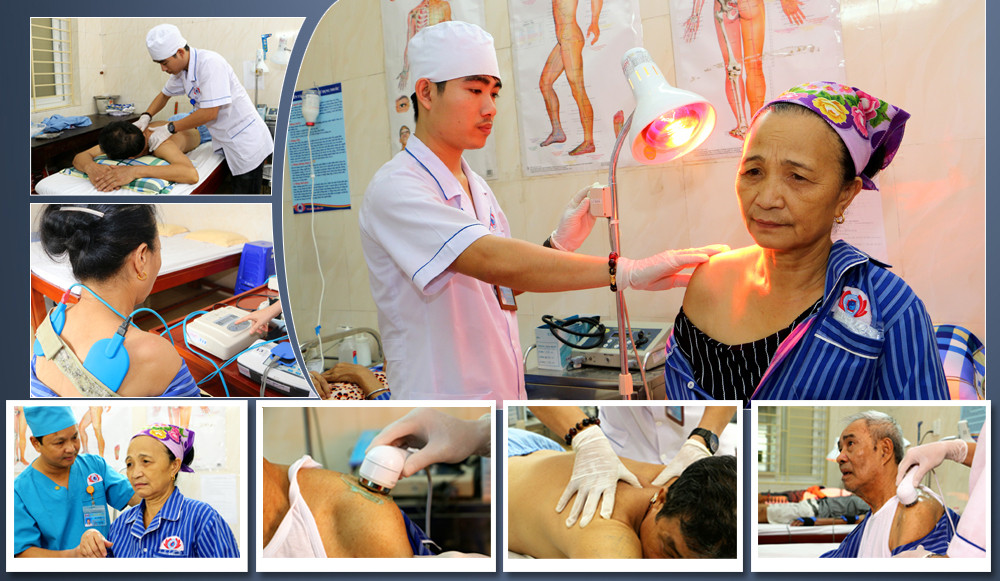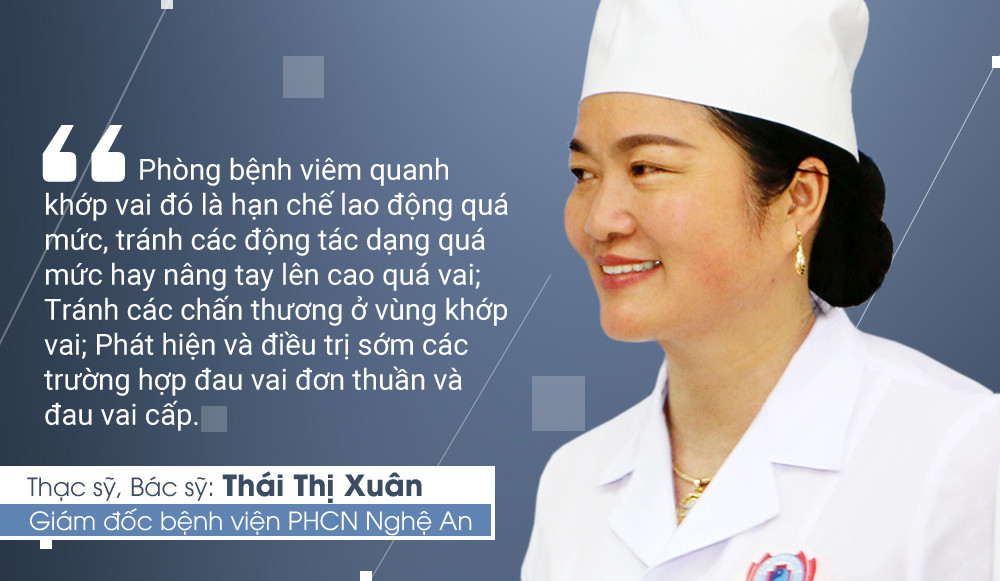Treatment of periarthritis of the shoulder by rehabilitation methods
(Baonghean.vn) - Rehabilitation treatment plays a very important role, not only in non-surgical cases but also in post-surgical cases. It is the safest and most effective method of treating periarthritis of the shoulder.
 |
Things to know
about periarthritis of the shoulder
Periarthritis of the shoulder (periarthritis humeroscapularis) is a general term used for inflammatory diseases of the soft tissue structures around the shoulder joint: tendons, bursa, joint capsule; not including diseases that damage the bone head, articular cartilage and synovial membrane such as infectious arthritis, rheumatoid arthritis... Periarthritis of the shoulder is a chronic inflammatory disease of the soft tissues around the joint such as tendons, muscles, ligaments and joint capsule causing pain and limited range of motion. The causes of these are very diverse such as trauma, degeneration of ligaments, cold, humid weather, diseases in the neck area such as degeneration, cervical disc herniation, neurological diseases... The manifestation of this disease is pain that appears when we extend and rotate the arm, pain spreads from the shoulder tip to both arms and down to the elbow. Reduces the motor function of the hand.
There are many causes of periarthritis of the shoulder such as age-related tendon degeneration, this disease often occurs in people over 50 years old. Heavy labor occupations have repetitive mechanical injuries, causing damage to the tendons around the shoulder joint such as the supraspinatus tendon, biceps brachii. Excessive exercise, playing some sports that require lifting the arms above the shoulder such as badminton, tennis, basketball, volleyball. Shoulder injuries due to falls, slips, car accidents, motorbikes and some other diseases such as cardiovascular, respiratory, diabetes, breast cancer, neurological, sleeping pill abuse).
Rehabilitation treatment
|
Rehabilitation plays a very important role, not only in non-surgical cases but also in post-surgical cases, as the safest and most effective treatment for periarthritis of the shoulder. Rehabilitation aims to avoid muscle atrophy and stiffness while restoring muscle strength after a period of illness. For shoulder rehabilitation, this process will be very slow, starting with passive exercises lasting for several weeks, followed by active exercises. This exercise process can last from several weeks to several months depending on whether or not rotator cuff reconstruction surgery is performed.
Doctor Thai Thi Xuan - Director of the Rehabilitation Hospital said: The principles of treating periarthritis of the shoulder include acute treatment and maintenance treatment. It is necessary to combine many different measures such as internal medicine, surgery, physical therapy, rehabilitation (infrared, electric pulse, massage, acupressure, ultrasound treatment, exercise under the guidance of a physical therapy specialist - rehabilitation), combined with pain relievers, anti-inflammatory drugs... If the patient is instructed and voluntarily exercises the shoulder joint, the ability to recover function will be fast, on the contrary, if not detected and treated promptly, over-exercise, the recovery time will be longer. Therefore, when having pain around the shoulder joint, the patient needs to go to Nghe An Rehabilitation Hospital for examination and rehabilitation treatment to limit future complications.
With that treatment method, Nghe An Rehabilitation Hospital has effectively treated many patients with periarthritis of the shoulder. A typical example is patient Ha Thi Thuyet (born in 1953) in Que Phong. Ms. Thuyet said: At first, there were only mild pains, after a while, these pains appeared very suddenly, the pain was intense, not only in the shoulder area but also spread to the area below the neck, to the arm and down to the hand, greatly affecting her health as well as her work. She also went to many places for examination but did not get better. After being treated at the Rehabilitation Hospital for a while, the pain has now completely subsided. Her shoulder joints move more smoothly than before.
Or like patient Nguyen Van Thuc (74 years old in Quynh Luu), he himself suffered a stroke, paralyzed half of his body leading to periarthritis of the shoulder due to inability to move. For patients like this, the hospital must have an appropriate treatment regimen: combining rehabilitation with methods such as ultrasound, infrared, acupressure massage..., and combining daily exercise as prescribed by the doctor with a nutritious diet.
How to prevent disease
|
Patients need to supplement adequate nutrition, especially substances that are good for the skeletal system such as calcium, Omega 3, vitamin D, manganese, magnesium, potassium... Specifically, patients with periarthritis of the shoulder should eat foods such as fish, cereals, tomatoes, oranges, milk, dark green vegetables... Cherries help secrete enzyme inhibitors, reduce inflammation. Supplement chondroitin and glucosamine sulfate to nourish cartilage, secrete more lubricants for joints. Sunbathe regularly to provide vitamin D for calcium metabolism in the body. Hot compresses, cold compresses, massage, hot baths... are measures that can be done by yourself to relieve pain for patients. In addition, patients also need to pay attention to actively prevent periarthritis of the shoulder to avoid recurrence such as: avoid sudden, excessive movement of the shoulder, avoid direct impacts, and get enough rest when there is a phenomenon of overwork. Perform care and exercises for patients with periarthritis of the shoulder at the same time fully and regularly to quickly get positive results.
Scientific and Technical Council - Nghe An Rehabilitation Hospital. With the spirit of "All for patient satisfaction"; "A place where patients place their trust".
Model: The first Green – Clean – Beautiful “Hospital – Hotel” in Nghe An. Address: No. 220, Binh Minh Street, Cua Lo Town, Nghe An.
* Contact phone number: Clinic phone number: 02383.949.709.
*24/7 hotline: 02383.952.020 - Hotline: 0966.251.414.
* Hotline: 0912.002.210 - Director: 0912.487.568.



